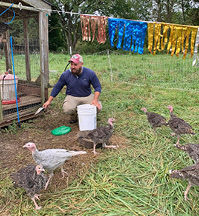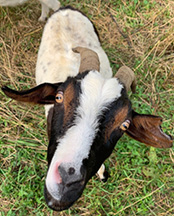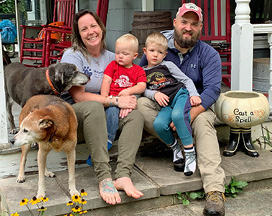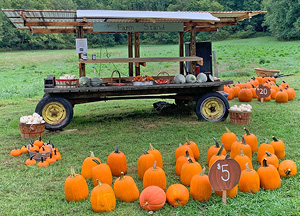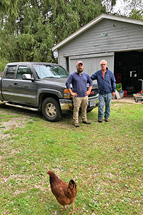New family brings fresh ideas to traditional farming
by Wendy Turrell
Mike and Melissa Keleman began their farming dream on July 1 this year, when they assumed the remaining 46 years of the 60-year lease Terry and Cindy Smith held at Goatfeathers Point Farm on Akron-Peninsula Road in the Cuyahoga Valley National Park.
Renamed Keleman Point Farm, the Kelemans’ land is part of an elite group of 10 historic, sustainably-worked farms in the CVNP, supervised by the nonprofit Countryside Initiative. The word “Point” in both names honors Nathanial Point, the original holder of the farm he established in 1875.
Although no new properties are currently available, Countryside Initiative CEO Tracy Emrick said that when land comes up for rehabilitation, a request for proposals goes out, and people can submit farm business plans in a competitive process. In the case of the Smiths’ farm, they wanted to retire, and a provision allowed the current lessee to propose a new lessee who is willing to continue with the farm’s approved plan. Countryside Initiative must vet and accept the potential new farmer.
When the Kelemans interviewed with the Smiths, they wholeheartedly agreed with their sustainable land management principals. The “closed system cycle” ensures all livestock are raised on and supported by the same land.
The Kelemans’ goats, chickens and heritage turkeys are systematically fed and forage on pastures, then moved to fresh acreage while the used land recovers nutrients from the manure left behind. In this process, the animals live as naturally as possible, perpetuating a cycle Mike calls “healthy animals, healthy land, healthy family, healthy community,” forgoing large-scale farming dependence on chemical fertilizers and pesticides.
Hay for winter feeding is also raised on the farm. The only addition to this natural feeding is leftover mash from a local brewery that Mike gives to his turkeys and goats as a “treat.”
Mike said he, Melissa, and their two- and five-year-old sons, Zeke and Lucas, “were at a stage in our life as a family that we wanted to establish our own farm.” After selling their old home early in 2020, they now live in the picturesque farmhouse.
Mike, a 2004 graduate of Nordonia High School, attended Hocking Technical College in Nelsonville and majored in forestry, intending to become a forest ranger. Melissa grew up in Bedford. Neither had a background in farming, but Mike was introduced to a love of gardening by his stepfather, who taught him how to raise and sell produce.
Mike and Melissa also worked together at an orchard in North Royalton, where he learned farm operation and Melissa learned about business in the farm’s market.
Eventually, Mike’s stepdad bought a farm, which Mike helped him clear and make profitable with organic composting practices.
Keleman Point Farm consists of 43 acres divided into 11 pastures: three for hay and eight for grazing. A small holding on Riverview Road has a second barn for breeding bucks, a pasture and a hay field.
The Kelemans received 60 goats from the Smiths’ herd. Keleman would like to cull that herd to around 20, then add Scottish Highland Cattle, an enormous, shaggy, horned breed that he would raise for beef as well as an attraction for CVNP visitors, along with the remaining docile goats.
Keleman’s Tennessee fainting goats (also known as myotonic) and various breeds of heritage turkeys are sold for their meat. All of the nine-week-old turkeys he was raising in September were already sold for Thanksgiving. He does not milk the goats, he said, because the daily milking process is extremely time-consuming, and the cost of stainless-steel milking equipment would be prohibitive.
Myotonic goats have a recessive gene for a cashmere undercoat. Not all the goats have it, but those that do grow luxuriant soft undercoats in the winter, which they rub off on plants in the spring. The Kelemans gather the cashmere fiber and save it until they accumulate enough to sell at the profitable rate of around $80 an ounce.
The family’s farm stand sells free-range chicken eggs and local seasonal produce. In 2021, the family plans to sell their own pasture-raised chickens and parceled cuts of goat meat, and will add a pick-it-yourself sunflower field and pumpkin patch.
As if the Kelemans are not busy enough, Melissa – along with her mother-in-law, former preschool director Patricia Rightmire Doran – has plans to open a “nature school” at the farm for children of all ages. Kids would learn the hands-on lessons the Keleman children are learning, such as the basics of chicken care and animal husbandry, alongside standard online curriculum.
The demanding farm work of summer and early fall was starting to wind down for the Kelemans in September, but the demands of a young family don’t, so Mike was planning to seasonally return to the job he held before becoming a full-time farmer: safety officer for a security company.
Although his new farming vocation is physically difficult, he affirmed, “I am thankful every day for what we have. It is truly a blessing and an honor to do what I do every day.”
Interested readers can follow the progress of Keleman Point Farm on its Facebook page. Countryside Initiative began in 1999 in partnership with the CVNP. For more information, visit countrysidefoodandfarms.org/countryside-initiative/.
Feature image photo caption: Mike Keleman (l) and Terry Smith stand in the farmyard. Photo by W. Turrell
